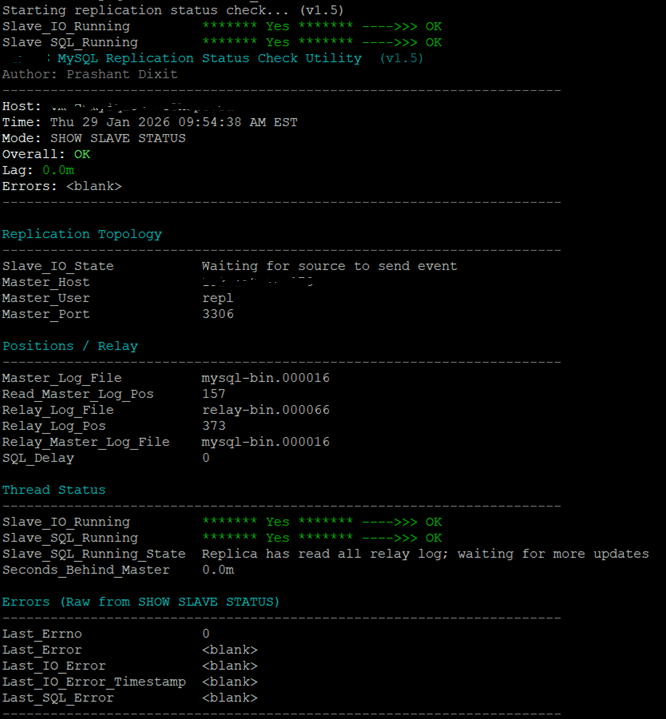I was doing some hands-on testing with Oracle GoldenGate 23ai DAA, trying to move data from an old but reliable Oracle 11g database into Microsoft Azure Fabric. The idea was simple enough. Capture changes from Oracle 11g, push them through GoldenGate 23ai, and land them in Fabric OneLake so they could be used by a Lakehouse or a Mirrored Database. On paper, it sounded clean. In real life… well, it took a bit of digging.
The source side was boring in a good way. Oracle 11g behaved exactly as expected. Extracts were running, trails were getting generated, no drama there. The real work was on the target side. I configured a Replicat using the File Writer with Parquet output, since Parquet is the natural fit for Microsoft Fabric. Fabric loves Parquet. Lakehouse loves Parquet. Mirrored databases too. So far, so good.
I started the Replicat and GoldenGate politely told me it had started. That tiny moment of relief you get when a command doesn’t fail right away. But then I checked the status… and it was STOPPED. No lag, no progress, nothing. That’s usually when you know something went wrong very early, before any real work even started.
So I opened the report file. And there it was. A Java error staring right back at me:
OGG (http://192.168.10.10:9001 OGG23AIDAA as BigData@) 18> START REPLICAT FATD11D
2025-12-12T21:25:18Z INFO OGG-00975 Replicat group FATD11D starting.
2025-12-12T21:25:18Z INFO OGG-15445 Replicat group FATD11D started.
OGG (http://192.168.10.10:9001 OGG23AIDAA as BigData@) 20> info replicat FATD11D
Replicat FATD11D Initialized 2025-12-12 16:24 Status STOPPED
Checkpoint Lag 00:00:00 (updated 00:00:55 ago)
Log Read Checkpoint File dirdat/i1000000000
First Record RBA 0
Encryption Profile LocalWallet
OGG (http://192.168.10.10:9001 OGG23AIDAA as BigData@) 21> view report FATD11D
***********************************************************************
Oracle GoldenGate for Distributed Applications and Analytics
Version 23.10.0.25.10 (Build 001)
Oracle GoldenGate Delivery
Version 23.10.1.25.10 OGGCORE_23.10.0.0.0OGGRU_LINUX.X64_251018.0830
Linux, x64, 64bit (optimized), Generic on Oct 18 2025 14:00:54
Copyright (C) 1995, 2025, Oracle and/or its affiliates. All rights reserved.
Starting at 2025-12-12 16:25:18
***********************************************************************
2025-12-12 16:25:19 INFO OGG-15052 Using Java class path: /testgg/app/ogg/ogg23ai/ogg23aidaa_MA//ggjava/ggjava.jar:/testgg/app/ogg/ogg23ai/ogg23aidaa_DEPLOYMENT/etc/conf/ogg:/u01/app/ogg/ogg
23ai/ogg23aidaa_MA/.
Exception in thread "main" java.lang.NoClassDefFoundError: org/apache/parquet/hadoop/metadata/CompressionCodecName
at oracle.goldengate.eventhandler.parquet.ParquetEventHandlerProperties.<init>(ParquetEventHandlerProperties.java:43)
at oracle.goldengate.eventhandler.parquet.ParquetEventHandler.<init>(ParquetEventHandler.java:53)
at java.base/jdk.internal.reflect.NativeConstructorAccessorImpl.newInstance0(Native Method)
at java.base/jdk.internal.reflect.NativeConstructorAccessorImpl.newInstance(NativeConstructorAccessorImpl.java:62)
at java.base/jdk.internal.reflect.DelegatingConstructorAccessorImpl.newInstance(DelegatingConstructorAccessorImpl.java:45)
at java.base/java.lang.reflect.Constructor.newInstance(Constructor.java:490)
at java.base/java.lang.Class.newInstance(Class.java:587)
at oracle.goldengate.datasource.eventhandler.EventHandlerFramework.instantiateEventHandler(EventHandlerFramework.java:219)
at oracle.goldengate.datasource.eventhandler.EventHandlerFramework.initEventHandler(EventHandlerFramework.java:163)
at oracle.goldengate.datasource.eventhandler.EventHandlerFramework.init(EventHandlerFramework.java:58)
at oracle.goldengate.handler.filewriter.FileWriterHandlerEO.init(FileWriterHandlerEO.java:627)
at oracle.goldengate.datasource.AbstractDataSource.addDataSourceListener(AbstractDataSource.java:602)
at oracle.goldengate.datasource.factory.DataSourceFactory.getDataSource(DataSourceFactory.java:164)
at oracle.goldengate.datasource.UserExitDataSourceLauncher.<init>(UserExitDataSourceLauncher.java:45)
at oracle.goldengate.datasource.UserExitMain.main(UserExitMain.java:109)
Caused by: java.lang.ClassNotFoundException: org.apache.parquet.hadoop.metadata.CompressionCodecName
at java.base/jdk.internal.loader.BuiltinClassLoader.loadClass(BuiltinClassLoader.java:581)
at java.base/jdk.internal.loader.ClassLoaders$AppClassLoader.loadClass(ClassLoaders.java:178)
at java.base/java.lang.ClassLoader.loadClass(ClassLoader.java:526)
... 15 more
2025-12-12 16:25:22 WARNING OGG-00869 java.lang.ClassNotFoundException: org.apache.parquet.hadoop.metadata.CompressionCodecName.
Source Context :
SourceFile : [/ade/aime_phxdbifa87/oggcore/OpenSys/src/gglib/ggdal/Adapter/Java/JavaAdapter.cpp]
SourceMethod : [HandleJavaException]
SourceLine : [350]
ThreadBacktrace : [19] elements
: [/testgg/app/ogg/ogg23ai/ogg23aidaa_MA/bin/../lib/libgglog.so(CMessageContext::AddThreadContext())]
: [/testgg/app/ogg/ogg23ai/ogg23aidaa_MA/bin/../lib/libgglog.so(CMessageFactory::CreateMessage(CSourceContext*, unsigned int, ...))]
: [/testgg/app/ogg/ogg23ai/ogg23aidaa_MA/bin/../lib/libgglog.so(_MSG_String(CSourceContext*, int, char const*, CMessageFactory::MessageDisposition))]
: [/testgg/app/ogg/ogg23ai/ogg23aidaa_MA/bin/../lib/libggjava.so()]
: [/testgg/app/ogg/ogg23ai/ogg23aidaa_MA/bin/../lib/libggjava.so(ggs::gglib::ggdal::CJavaAdapter::Open())]
: [/testgg/app/ogg/ogg23ai/ogg23aidaa_MA/bin/replicat(ggs::gglib::ggdal::CDALAdapter::Open())]
: [/testgg/app/ogg/ogg23ai/ogg23aidaa_MA/bin/replicat(GenericImpl::Open())]
: [/testgg/app/ogg/ogg23ai/ogg23aidaa_MA/bin/replicat(GenericImpl::GetWriter())]
: [/testgg/app/ogg/ogg23ai/ogg23aidaa_MA/bin/replicat(GenericImpl::GetGenericDBType())]
: [/testgg/app/ogg/ogg23ai/ogg23aidaa_MA/bin/replicat(ggs::er::ReplicatContext::ReplicatContext(ggs::gglib::ggapp::ReplicationContextParams const&, bool, ggs::gglib::
ggmetadata::MetadataContext*, ggs::er::ReplicatContext::LogBSNManager*))]
: [/testgg/app/ogg/ogg23ai/ogg23aidaa_MA/bin/replicat(ggs::er::ReplicatContext::createReplicatContext(ggs::gglib::ggapp::ReplicationContextParams const&, ggs::gglib::
ggdatasource::DataSourceParams const&, ggs::gglib::ggmetadata::MetadataContext*))]
: [/testgg/app/ogg/ogg23ai/ogg23aidaa_MA/bin/replicat()]
: [/testgg/app/ogg/ogg23ai/ogg23aidaa_MA/bin/replicat(ggs::gglib::MultiThreading::MainThread::ExecMain())]
: [/testgg/app/ogg/ogg23ai/ogg23aidaa_MA/bin/replicat(ggs::gglib::MultiThreading::Thread::RunThread(ggs::gglib::MultiThreading::Thread::ThreadArgs*))]
: [/testgg/app/ogg/ogg23ai/ogg23aidaa_MA/bin/replicat(ggs::gglib::MultiThreading::MainThread::Run(int, char**))]
: [/testgg/app/ogg/ogg23ai/ogg23aidaa_MA/bin/replicat(main)]
: [/lib64/libc.so.6()]
: [/lib64/libc.so.6(__libc_start_main)]
: [/testgg/app/ogg/ogg23ai/ogg23aidaa_MA/bin/replicat(_start)]
2025-12-12 16:25:22 ERROR OGG-15051 Java or JNI exception:
java.lang.NoClassDefFoundError: org/apache/parquet/hadoop/metadata/CompressionCodecName.
2025-12-12 16:25:22 ERROR OGG-01668 PROCESS ABENDING.
At that point it clicked. GoldenGate itself was fine. Oracle 11g was fine. Fabric wasn’t even in the picture yet. The problem was simpler. The Parquet libraries were missing.
All of the pre-reqs are there in the DependencyDownloader directory. Inside you will find all scripts for everything… Parquet, Hadoop, OneLake, Kafka, and more. Before touching anything, I checked Java. Java 17 was already installed. I ran the Parquet dependency script. Maven kicked in, downloaded a bunch of JARs, and finished successfully. I restarted the Replicat, feeling pretty confident. And… it failed again. Different error this time, though, which honestly felt like progress.
[oggadmin@D-ADON-01-CC-VM bin]$
[oggadmin@D-ADON-01-CC-VM bin]$ find /u01/app/ogg/ogg23ai -name "*.properties" | egrep -i "sample|example|handler|parquet|filewriter" | head -n 20
/testgg/app/ogg/ogg23ai/ogg23aidaa_MA/opt/AdapterExamples/templates/oci.properties
/testgg/app/ogg/ogg23ai/ogg23aidaa_MA/opt/AdapterExamples/templates/kafka.properties
/testgg/app/ogg/ogg23ai/ogg23aidaa_MA/opt/AdapterExamples/templates/hbase.properties
/testgg/app/ogg/ogg23ai/ogg23aidaa_MA/opt/AdapterExamples/templates/parquet.properties
/testgg/app/ogg/ogg23ai/ogg23aidaa_MA/opt/AdapterExamples/templates/kafkaconnect.properties
/testgg/app/ogg/ogg23ai/ogg23aidaa_MA/opt/AdapterExamples/templates/azureservicebus.properties
/testgg/app/ogg/ogg23ai/ogg23aidaa_MA/opt/AdapterExamples/templates/mongo.properties
/testgg/app/ogg/ogg23ai/ogg23aidaa_MA/opt/AdapterExamples/templates/filewriter.properties
/testgg/app/ogg/ogg23ai/ogg23aidaa_MA/opt/AdapterExamples/templates/bigquery.properties
/testgg/app/ogg/ogg23ai/ogg23aidaa_MA/opt/AdapterExamples/templates/nosql.properties
/testgg/app/ogg/ogg23ai/ogg23aidaa_MA/opt/AdapterExamples/templates/hdfs.properties
/testgg/app/ogg/ogg23ai/ogg23aidaa_MA/opt/AdapterExamples/templates/synapse.properties
/testgg/app/ogg/ogg23ai/ogg23aidaa_MA/opt/AdapterExamples/templates/redshift.properties
/testgg/app/ogg/ogg23ai/ogg23aidaa_MA/opt/AdapterExamples/templates/pubsub.properties
/testgg/app/ogg/ogg23ai/ogg23aidaa_MA/opt/AdapterExamples/templates/s3.properties
/testgg/app/ogg/ogg23ai/ogg23aidaa_MA/opt/AdapterExamples/templates/redis.properties
/testgg/app/ogg/ogg23ai/ogg23aidaa_MA/opt/AdapterExamples/templates/elasticsearch.properties
/testgg/app/ogg/ogg23ai/ogg23aidaa_MA/opt/AdapterExamples/templates/jdbc.properties
/testgg/app/ogg/ogg23ai/ogg23aidaa_MA/opt/AdapterExamples/templates/adw.properties
/testgg/app/ogg/ogg23ai/ogg23aidaa_MA/opt/AdapterExamples/templates/jms.properties
[oggadmin@D-ADON-01-CC-VM bin]$
[oggadmin@D-ADON-01-CC-VM bin]$
[oggadmin@D-ADON-01-CC-VM bin]$ ls -ltrh /testgg/app/ogg/ogg23ai/ogg23aidaa_MA/ggjava
total 60K
-rwxrwxr-x. 1 oggadmin ogg 34K Jun 5 2024 NOTICES.txt
-rwxrwxr-x. 1 oggadmin ogg 95 Oct 21 10:50 ggjava-version.txt
-rwxrwxr-x. 1 oggadmin ogg 9.5K Oct 21 10:50 ggjava.jar
drwxr-xr-x. 5 oggadmin ogg 4.0K Jan 29 16:51 resources
drwxr-xr-x. 6 oggadmin ogg 4.0K Jan 29 16:51 maven-3.9.6
[oggadmin@D-ADON-01-CC-VM bin]$ find /u01/app/ogg/ogg23ai -iname "onelake.sh" -o -iname "*parquet*.sh" -o -iname "*dependency*.sh"
/testgg/app/ogg/ogg23ai/ogg23aidaa_MA/opt/DependencyDownloader/onelake.sh
/testgg/app/ogg/ogg23ai/ogg23aidaa_MA/opt/DependencyDownloader/parquet.sh
[oggadmin@D-ADON-01-CC-VM bin]$ /testgg/app/ogg/ogg23ai/ogg23aidaa_MA/opt/DependencyDownloader/onelake.sh
[oggadmin@D-ADON-01-CC-VM bin]$ cd /testgg/app/ogg/ogg23ai/ogg23aidaa_MA/opt/DependencyDownloader/
[oggadmin@D-ADON-01-CC-VM DependencyDownloader]$ ls
aws.sh cassandra_dse.sh gcs.sh hbase_hortonworks.sh kafka.sh orc.sh snowflake.sh
azure_blob_storage.sh cassandra.sh googlepubsub.sh hbase.sh kinesis.sh parquet.sh snowflakestreaming.sh
bigquery.sh config_proxy.sh hadoop_azure_cloudera.sh internal_scripts mongodb_capture.sh project synapse.sh
bigquerystreaming.sh databricks.sh hadoop_cloudera.sh kafka_cloudera.sh mongodb.sh redis.sh velocity.sh
cassandra_capture_3x.sh docs hadoop_hortonworks.sh kafka_confluent_protobuf.sh onelake.sh redshift.sh xmls
cassandra_capture_4x.sh download_dependencies.sh hadoop.sh kafka_confluent.sh oracle_nosql_sdk.sh s3.sh
cassandra_capture_dse.sh elasticsearch_java.sh hbase_cloudera.sh kafka_hortonworks.sh oracle_oci.sh snowflake-fips.sh
[oggadmin@D-ADON-01-CC-VM DependencyDownloader]$
[oggadmin@D-ADON-01-CC-VM DependencyDownloader]$ java -version
openjdk version "17.0.18" 2026-01-20 LTS
OpenJDK Runtime Environment (Red_Hat-17.0.18.0.8-1.0.1) (build 17.0.18+8-LTS)
OpenJDK 64-Bit Server VM (Red_Hat-17.0.18.0.8-1.0.1) (build 17.0.18+8-LTS, mixed mode, sharing)
[oggadmin@D-ADON-01-CC-VM DependencyDownloader]$
[oggadmin@D-ADON-01-CC-VM DependencyDownloader]$ ./onelake.sh
openjdk version "17.0.18" 2026-01-20 LTS
Java is installed.
Apache Maven 3.9.6 (bc0240f3c744dd6b6ec2920b3cd08dcc295161ae)
Maven is accessible.
Root Configuration Script
INFO: This is the Maven binary [../../ggjava/maven-3.9.6/bin/mvn].
INFO: This is the location of the settings.xml file [./docs/settings_np.xml].
INFO: This is the location of the toolchains.xml file [./docs/toolchains.xml].
INFO: The dependencies will be written to the following directory[../dependencies/onelake].
INFO: The Maven coordinates are the following:
INFO: Dependency 1
INFO: Group ID [com.azure].
INFO: Artifact ID [azure-storage-file-datalake].
INFO: Version [12.20.0]
INFO: Dependency 2
INFO: Group ID [com.azure].
INFO: Artifact ID [azure-identity].
INFO: Version [1.13.1]
[INFO] Scanning for projects...
[INFO]
[INFO] ---------------< oracle.goldengate:dependencyDownloader >---------------
[INFO] Building dependencyDownloader 1.0
[INFO] from pom_central_v2.xml
[INFO] --------------------------------[ pom ]---------------------------------
Downloading from central: https://repo.maven.apache.org/maven2/org/apache/maven/plugins/maven-clean-plugin/3.2.0/maven-clean-plugin-3.2.0.pom
Downloaded from central: https://repo.maven.apache.org/maven2/org/apache/maven/plugins/maven-clean-plugin/3.2.0/maven-clean-plugin-3.2.0.pom (5.3 kB at 24 kB/s)
Downloading from central: https://repo.maven.apache.org/maven2/org/apache/maven/plugins/maven-plugins/35/maven-plugins-35.pom
Downloaded from central: https://repo.maven.apache.org/maven2/org/apache/maven/plugins/maven-plugins/35/maven-plugins-35.pom (9.9 kB at 431 kB/s)
Downloading from central: https://repo.maven.apache.org/maven2/org/apache/maven/maven-parent/35/maven-parent-35.pom
Downloaded from central: https://repo.maven.apache.org/maven2/org/apache/maven/maven-parent/35/maven-parent-35.pom (45 kB at 1.7 MB/s)
Downloading from central: https://repo.maven.apache.org/maven2/org/apache/apache/25/apache-25.pom
Downloaded from central: https://repo.maven.apache.org/maven2/org/apache/apache/25/apache-25.pom (21 kB at 1.0 MB/s)
Downloading from central: https://repo.maven.apache.org/maven2/org/apache/maven/plugins/maven-clean-plugin/3.2.0/maven-clean-plugin-3.2.0.jar
Downloaded from central: https://repo.maven.apache.org/maven2/org/apache/maven/plugins/maven-clean-plugin/3.2.0/maven-clean-plugin-3.2.0.jar (36 kB at 1.4 MB/s)
Downloading from central: https://repo.maven.apache.org/maven2/org/apache/maven/plugins/maven-dependency-plugin/2.9/maven-dependency-plugin-2.9.pom
Downloaded from central: https://repo.maven.apache.org/maven2/org/apache/maven/plugins/maven-dependency-plugin/2.9/maven-dependency-plugin-2.9.pom (13 kB at 602 kB/s)
Downloading from central: https://repo.maven.apache.org/maven2/org/apache/maven/plugins
.........
...............
...................
[INFO] Copying netty-tcnative-boringssl-static-2.0.65.Final-windows-x86_64.jar to /testgg/app/ogg/ogg23ai/ogg23aidaa_MA/opt/DependencyDownloader/dependencies/onelake/netty-tcnative-boringssl-static-2.0.65.Final-windows-x86_64.jar
[INFO] Copying reactive-streams-1.0.4.jar to /testgg/app/ogg/ogg23ai/ogg23aidaa_MA/opt/DependencyDownloader/dependencies/onelake/reactive-streams-1.0.4.jar
[INFO] Copying oauth2-oidc-sdk-11.9.1.jar to /testgg/app/ogg/ogg23ai/ogg23aidaa_MA/opt/DependencyDownloader/dependencies/onelake/oauth2-oidc-sdk-11.9.1.jar
[INFO] ------------------------------------------------------------------------
[INFO] BUILD SUCCESS
[INFO] ------------------------------------------------------------------------
[INFO] Total time: 8.334 s
[INFO] Finished at: 2025-12-12T16:45:52-05:00
[INFO] ------------------------------------------------------------------------
[oggadmin@D-ADON-01-CC-VM DependencyDownloader]$
[oggadmin@D-ADON-01-CC-VM DependencyDownloader]$
[oggadmin@D-ADON-01-CC-VM DependencyDownloader]$
[oggadmin@D-ADON-01-CC-VM DependencyDownloader]$
[oggadmin@D-ADON-01-CC-VM templates]$ cd /testgg/app/ogg/ogg23ai/ogg23aidaa_MA/opt/DependencyDownloader
[oggadmin@D-ADON-01-CC-VM templates]$ ./parquet.sh 1.13.1
openjdk version "17.0.18" 2026-01-20 LTS
Java is installed.
Apache Maven 3.9.6 (bc0240f3c744dd6b6ec2920b3cd08dcc295161ae)
Maven is accessible.
Root Configuration Script
INFO: This is the Maven binary [../../ggjava/maven-3.9.6/bin/mvn].
INFO: This is the location of the settings.xml file [./docs/settings_np.xml].
INFO: This is the location of the toolchains.xml file [./docs/toolchains.xml].
INFO: The dependencies will be written to the following directory[../dependencies/parquet_1.13.1].
.....
...........
.................
.....
Downloading from central: https://repo.maven.apache.org/maven2/org/apache/parquet/parquet-hadoop/1.13.1/parquet-hadoop-1.13.1.pom
Downloaded from central: https://repo.maven.apache.org/maven2/org/apache/parquet/parquet-hadoop/1.13.1/parquet-hadoop-1.13.1.pom (15 kB at 69 kB/s)
Downloading from central: https://repo.maven.apache.org/maven2/org/apache/parquet/parquet/1.13.1/parquet-1.13.1.pom
Downloaded from central: https://repo.maven.apache.org/maven2/org/apache/parquet/parquet/1.13.1/parquet-1.13.1.pom (25 kB at 790 kB/s)
Downloading from central: https://repo.maven.apache.org/maven2/org/apache/parquet/parquet-column/1.13.1/parquet-column-1.13.1.pom
Downloaded from central: https://repo.maven.apache.org/maven2/org/apache/parquet/parquet-column/1.13.1/parquet-column-1.13.1.pom (6.0 kB at 238 kB/s)
Downloading from central: https://repo.maven.apache.org/maven2/org/apache/parquet/parquet-common/1.13.1/parquet-common-1.13.1.pom
Downloaded from central: https://repo.maven.apache.org/maven2/org/apache/parquet/parquet-common/1.13.1/parquet-common-1.13.1.pom (3.4 kB at 143 kB/s)
Downloading from central: https://repo.maven.apache.org/maven2/org/apache/parquet/parquet-format-structures/1.13.1/parquet-format-structures-1.13.1.pom
......
..............
...............
[INFO] Copying jackson-annotations-2.12.7.jar to /testgg/app/ogg/ogg23ai/ogg23aidaa_MA/opt/DependencyDownloader/dependencies/parquet_1.13.1/jackson-annotations-2.12.7.jar
[INFO] ------------------------------------------------------------------------
[INFO] BUILD SUCCESS
[INFO] ------------------------------------------------------------------------
[INFO] Total time: 2.119 s
[INFO] Finished at: 2025-12-12T16:52:03-05:00
[INFO] ------------------------------------------------------------------------
Once again the replicate on target side failed to start and this time with a different error.
OGG (http://192.168.10.10:9001 OGG23AIDAA as BigData@) 8> info REPLICAT FATD11D
Replicat FATD11D Initialized 2025-12-12 16:24 Status STOPPED
Checkpoint Lag 00:00:00 (updated 00:34:28 ago)
Log Read Checkpoint File dirdat/i1000000000
First Record RBA 0
Encryption Profile LocalWallet
OGG (http://192.168.10.10:9001 OGG23AIDAA as BigData@) 9> view report FATD11D
***********************************************************************
Oracle GoldenGate for Distributed Applications and Analytics
Version 23.10.0.25.10 (Build 001)
Oracle GoldenGate Delivery
Version 23.10.1.25.10 OGGCORE_23.10.0.0.0OGGRU_LINUX.X64_251018.0830
Linux, x64, 64bit (optimized), Generic on Oct 18 2025 14:00:54
Copyright (C) 1995, 2025, Oracle and/or its affiliates. All rights reserved.
Starting at 2025-12-12 16:58:47
***********************************************************************
2025-12-12 16:58:47 INFO OGG-15052 Using Java class path: /testgg/app/ogg/ogg23ai/ogg23aidaa_MA//ggjava/ggjava.jar:/testgg/app/ogg/ogg23ai/ogg23aidaa_DEPLOYMENT/etc/conf/ogg:/u01/app/ogg/ogg
23ai/ogg23aidaa_MA/:/testgg/app/ogg/ogg23ai/ogg23aidaa_MA/opt/DependencyDownloader/dependencies/onelake/*:/testgg/app/ogg/ogg23ai/ogg23aidaa_MA/opt/DependencyDownloader/dependencies/parquet_1.13.
1/*.
Exception in thread "main" java.lang.NoClassDefFoundError: org/apache/hadoop/conf/Configuration
at oracle.goldengate.eventhandler.parquet.GGParquetWriter.init(GGParquetWriter.java:72)
at oracle.goldengate.eventhandler.parquet.ParquetEventHandler.init(ParquetEventHandler.java:219)
at oracle.goldengate.datasource.eventhandler.EventHandlerFramework.initEventHandler(EventHandlerFramework.java:168)
at oracle.goldengate.datasource.eventhandler.EventHandlerFramework.init(EventHandlerFramework.java:58)
at oracle.goldengate.handler.filewriter.FileWriterHandlerEO.init(FileWriterHandlerEO.java:627)
at oracle.goldengate.datasource.AbstractDataSource.addDataSourceListener(AbstractDataSource.java:602)
at oracle.goldengate.datasource.factory.DataSourceFactory.getDataSource(DataSourceFactory.java:164)
at oracle.goldengate.datasource.UserExitDataSourceLauncher.<init>(UserExitDataSourceLauncher.java:45)
at oracle.goldengate.datasource.UserExitMain.main(UserExitMain.java:109)
Caused by: java.lang.ClassNotFoundException: org.apache.hadoop.conf.Configuration
at java.base/jdk.internal.loader.BuiltinClassLoader.loadClass(BuiltinClassLoader.java:581)
at java.base/jdk.internal.loader.ClassLoaders$AppClassLoader.loadClass(ClassLoaders.java:178)
at java.base/java.lang.ClassLoader.loadClass(ClassLoader.java:526)
... 9 more
2025-12-12 16:58:48 WARNING OGG-00869 java.lang.ClassNotFoundException: org.apache.hadoop.conf.Configuration.
Source Context :
SourceFile : [/ade/aime_phxdbifa87/oggcore/OpenSys/src/gglib/ggdal/Adapter/Java/JavaAdapter.cpp]
SourceMethod : [HandleJavaException]
SourceLine : [350]
ThreadBacktrace : [19] elements
: [/testgg/app/ogg/ogg23ai/ogg23aidaa_MA/bin/../lib/libgglog.so(CMessageContext::AddThreadContext())]
: [/testgg/app/ogg/ogg23ai/ogg23aidaa_MA/bin/../lib/libgglog.so(CMessageFactory::CreateMessage(CSourceContext*, unsigned int, ...))]
: [/testgg/app/ogg/ogg23ai/ogg23aidaa_MA/bin/../lib/libgglog.so(_MSG_String(CSourceContext*, int, char const*, CMessageFactory::MessageDisposition))]
: [/testgg/app/ogg/ogg23ai/ogg23aidaa_MA/bin/../lib/libggjava.so()]
: [/testgg/app/ogg/ogg23ai/ogg23aidaa_MA/bin/../lib/libggjava.so(ggs::gglib::ggdal::CJavaAdapter::Open())]
: [/testgg/app/ogg/ogg23ai/ogg23aidaa_MA/bin/replicat(ggs::gglib::ggdal::CDALAdapter::Open())]
: [/testgg/app/ogg/ogg23ai/ogg23aidaa_MA/bin/replicat(GenericImpl::Open())]
: [/testgg/app/ogg/ogg23ai/ogg23aidaa_MA/bin/replicat(GenericImpl::GetWriter())]
: [/testgg/app/ogg/ogg23ai/ogg23aidaa_MA/bin/replicat(GenericImpl::GetGenericDBType())]
: [/testgg/app/ogg/ogg23ai/ogg23aidaa_MA/bin/replicat(ggs::er::ReplicatContext::ReplicatContext(ggs::gglib::ggapp::ReplicationContextParams const&, bool, ggs::gglib::
ggmetadata::MetadataContext*, ggs::er::ReplicatContext::LogBSNManager*))]
: [/testgg/app/ogg/ogg23ai/ogg23aidaa_MA/bin/replicat(ggs::er::ReplicatContext::createReplicatContext(ggs::gglib::ggapp::ReplicationContextParams const&, ggs::gglib::
ggdatasource::DataSourceParams const&, ggs::gglib::ggmetadata::MetadataContext*))]
: [/testgg/app/ogg/ogg23ai/ogg23aidaa_MA/bin/replicat()]
: [/testgg/app/ogg/ogg23ai/ogg23aidaa_MA/bin/replicat(ggs::gglib::MultiThreading::MainThread::ExecMain())]
: [/testgg/app/ogg/ogg23ai/ogg23aidaa_MA/bin/replicat(ggs::gglib::MultiThreading::Thread::RunThread(ggs::gglib::MultiThreading::Thread::ThreadArgs*))]
: [/testgg/app/ogg/ogg23ai/ogg23aidaa_MA/bin/replicat(ggs::gglib::MultiThreading::MainThread::Run(int, char**))]
: [/testgg/app/ogg/ogg23ai/ogg23aidaa_MA/bin/replicat(main)]
: [/lib64/libc.so.6()]
: [/lib64/libc.so.6(__libc_start_main)]
: [/testgg/app/ogg/ogg23ai/ogg23aidaa_MA/bin/replicat(_start)]
2025-12-12 16:58:48 ERROR OGG-15051 Java or JNI exception:
java.lang.NoClassDefFoundError: org/apache/hadoop/conf/Configuration.
2025-12-12 16:58:48 ERROR OGG-01668 PROCESS ABENDING.
That one made me pause for a second. The target wasn’t HDFS. I wasn’t running Hadoop. This was Microsoft Fabric. But here’s the catch. Parquet depends on Hadoop, even when you’re not using Hadoop directly. Some core Parquet classes expect Hadoop configuration classes to exist. No Hadoop libs, no Parquet writer.
So back to the DependencyDownloader I went, this time running the Hadoop script. More downloads, more JARs, more waiting.
[oggadmin@D-ADON-01-CC-VM DependencyDownloader]$
[oggadmin@D-ADON-01-CC-VM DependencyDownloader]$ cd /testgg/app/ogg/ogg23ai/ogg23aidaa_MA/opt/DependencyDownloader
[oggadmin@D-ADON-01-CC-VM DependencyDownloader]$ ./hadoop.sh 3.4.2
openjdk version "17.0.18" 2026-01-20 LTS
Java is installed.
Apache Maven 3.9.6 (bc0240f3c744dd6b6ec2920b3cd08dcc295161ae)
Maven is accessible.
Root Configuration Script
INFO: This is the Maven binary [../../ggjava/maven-3.9.6/bin/mvn].
INFO: This is the location of the settings.xml file [./docs/settings_np.xml].
INFO: This is the location of the toolchains.xml file [./docs/toolchains.xml].
INFO: The dependencies will be written to the following directory[../dependencies/hadoop_3.4.2].
[INFO] ---------------< oracle.goldengate:dependencyDownloader >---------------
[INFO] Building dependencyDownloader 1.0
[INFO] from pom_central_v2.xml
[INFO] --------------------------------[ pom ]---------------------------------
Downloading from central: https://repo.maven.apache.org/maven2/org/apache/hadoop/hadoop-client/3.4.2/hadoop-client-3.4.2.pom
Downloaded from central: https://repo.maven.apache.org/maven2/org/apache/hadoop/hadoop-client/3.4.2/hadoop-client-3.4.2.pom (11 kB at 58 kB/s)
Downloading from central: https://repo.maven.apache.org/maven2/org/apache/hadoop/hadoop-project-dist/3.4.2/hadoop-project-dist-3.4.2.pom
Downloaded from central: https://repo.maven.apach
..........
................
.....................
[INFO] Copying netty-codec-stomp-4.1.118.Final.jar to /testgg/app/ogg/ogg23ai/ogg23aidaa_MA/opt/DependencyDownloader/dependencies/hadoop_3.4.2/netty-codec-stomp-4.1.118.Final.jar
[INFO] Copying dnsjava-3.6.1.jar to /testgg/app/ogg/ogg23ai/ogg23aidaa_MA/opt/DependencyDownloader/dependencies/hadoop_3.4.2/dnsjava-3.6.1.jar
[INFO] Copying netty-transport-native-unix-common-4.1.118.Final.jar to /testgg/app/ogg/ogg23ai/ogg23aidaa_MA/opt/DependencyDownloader/dependencies/hadoop_3.4.2/netty-transport-native-unix-common-4.1.118.Final.jar
[INFO] ------------------------------------------------------------------------
[INFO] BUILD SUCCESS
[INFO] ------------------------------------------------------------------------
[INFO] Total time: 7.627 s
[INFO] Finished at: 2025-12-12T18:02:30-05:00
[INFO] ------------------------------------------------------------------------
[oggadmin@D-ADON-01-CC-VM DependencyDownloader]$
[oggadmin@D-ADON-01-CC-VM DependencyDownloader]$
Once that finished, I restarted the Replicat again. No big expectations this time. This time it stayed up.
OGG (http://192.168.10.10:9001 OGG23AIDAA as BigData@) 2> START REPLICAT FATD11D
2025-12-12T23:07:54Z INFO OGG-00975 Replicat group FATD11D starting.
2025-12-12T23:07:54Z INFO OGG-15445 Replicat group FATD11D started.
OGG (http://192.168.10.10:9001 OGG23AIDAA as BigData@) 3> info FATD11D
No Extract groups exist.
Replicat FATD11D Last Started 2025-12-12 18:07 Status RUNNING
Checkpoint Lag 00:00:00 (updated 00:00:02 ago)
Process ID 47420
Log Read Checkpoint File dirdat/i10000000001
First Record RBA 167873
Encryption Profile LocalWallet
The big takeaway from this whole exercise is pretty simple. When you’re doing Oracle database to Microsoft Azure Fabric using GoldenGate 23ai DAA, the tricky part is not Oracle, and not Fabric. It’s the middle layer. Parquet is the bridge, and Parquet brings Hadoop with it, whether you like it or not. If those dependencies aren’t staged correctly, the OGG processes will start, smile at you, and then quietly fall over 😀
Once everything was in place, though, the setup worked exactly the way it should. A clean path from a legacy Oracle 11g database into a modern Microsoft Fabric Lakehouse. No magic. Just the right pieces, in the right order… and a bit of patience
Hope It Helped!
Prashant Dixit






